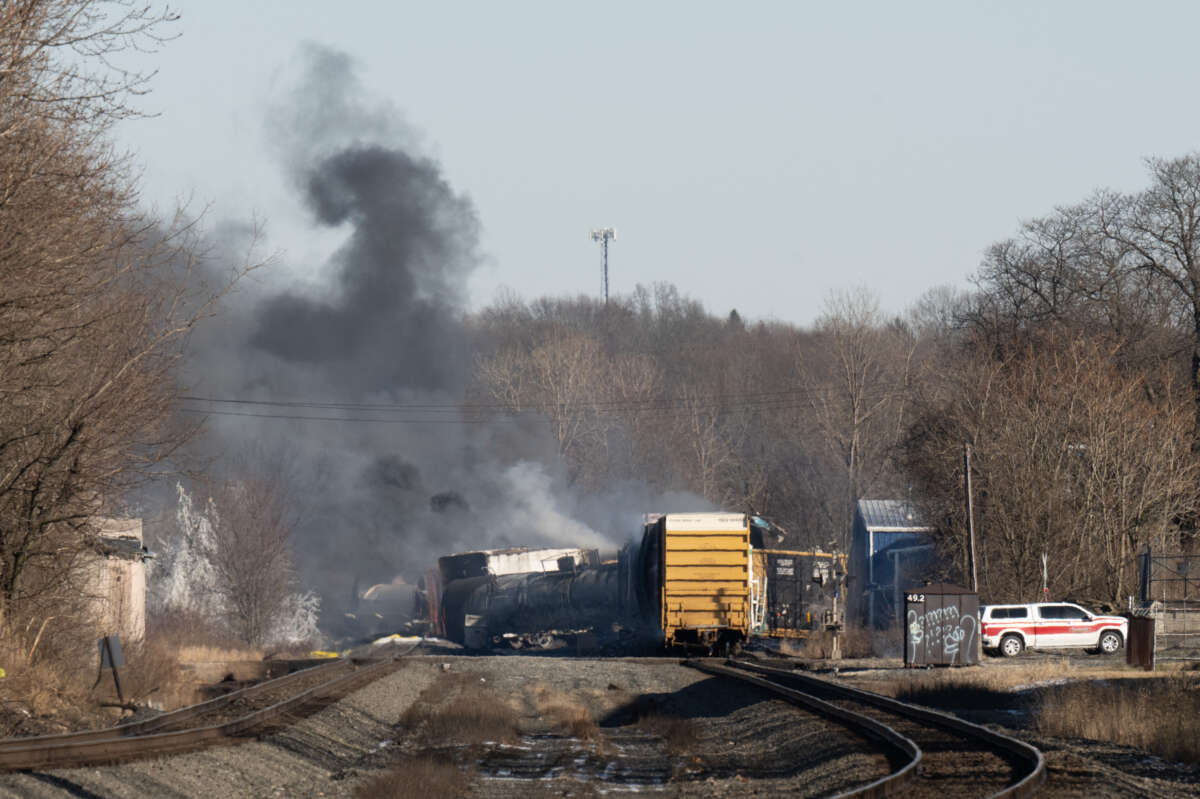Support justice-driven, accurate and transparent news — make a quick donation to Truthout today!
Last week a train derailed in East Palestine, Ohio, sending 50 cars carrying toxic chemicals careening off their tracks. The resulting fire burned for days, forcing hundreds of evacuations and blanketing the small village on the Ohio-Pennsylvania border in smoke. Runoff from the site contaminated two streams nearby. Over the next week, as officials worked to avoid a deadly explosion that could launch “deadly shrapnel as far as a mile,” they slowly released vinyl chloride, a colorless gas linked to various cancers, from five of the railcars that were transporting it to its destination.
The blaze is now under control, and residents were allowed to return to their homes late Wednesday, five days after the train derailed. Local authorities say the air and water are safe. The Environmental Protection Agency, or EPA, has been conducting air monitoring in the area. On Wednesday, the agency reported that its monitors detected volatile organic compounds, a class of toxic chemicals, but that their levels were below thresholds that trigger public health concerns. It also reported detecting particulate matter, the fine soot that makes up smoke and causes respiratory issues, above public health thresholds.
The disaster is a reminder of the health and safety risks that accompany reliance on fossil fuels. Vinyl chloride, the chemical released from the railcars, is a petrochemical produced from the hydrocarbon ethylene. Its primary use is in making polyvinyl chloride, or PVC, a type of plastic that is widely used to make pipes, flooring, wire insulation, and a slew of single-use medical devices.
Over the last decade, with the rise of fracking and the subsequent boom in U.S. oil and gas production, fossil fuel companies have turned to plastic production as a way to capitalize on cheap (until recently) oil and gas. Researchers at the Organisation for Economic Co-operation and Development, an intergovernmental organization with 38 member countries, projected that global plastics production would roughly quadruple from 407 million tonnes a year to 1,600 million tonnes in 2050. The consequences of the growth are felt most acutely by communities on the front lines of fossil fuel production and refining — such as the Gulf Coast, which has seen a massive buildout of petrochemical facilities — and in towns like East Palestine that reside along pipeline and railroad routes.
Plastics are “so pervasive in our economy,” said Judith Enck, a former EPA regional administrator and current president of the environmental group Beyond Plastics. “Wherever a range of plastic products are being made, you will often have to transport vinyl chloride to the facility, and it’s not without its risks, as we’ve seen this past week.”
Train derailments are not uncommon. More than 250 trains have derailed in the last decade, according to the Pipeline and Hazardous Materials Safety Administration, a branch of the federal Department of Transportation. Of them, roughly half involved hazardous waste. Trains that carry hazardous waste face additional federal regulations, but the Norfolk Southern train that derailed in East Palestine was not considered a “high-hazard flammable train,” federal officials told The Lever, an investigative news outlet. Despite the combustibility of vinyl chloride, industry lobbyists have successfully limited many trains carrying the chemical from the most stringent federal regulations.
The industry group American Association of Railroads, of which Norfolk Southern is a member, has also fought stricter safety standards including an updated braking system. Electronically Controlled Pneumatic brakes, or ECP brakes, can decrease train stopping distances and could have prevented the derailment last week, according to The Lever. Norfolk spent years lobbying against the use of these brakes, and the Ohio train was not outfitted with the technology.
At least four class action lawsuits have been filed against Norfolk in the last few days. Residents have claimed the derailment and the resulting evacuation forced them out of their homes and businesses causing economic losses, emotional distress, and exposure to hazardous chemicals.
A terrifying moment. We appeal for your support.
In the last weeks, we have witnessed an authoritarian assault on communities in Minnesota and across the nation.
The need for truthful, grassroots reporting is urgent at this cataclysmic historical moment. Yet, Trump-aligned billionaires and other allies have taken over many legacy media outlets — the culmination of a decades-long campaign to place control of the narrative into the hands of the political right.
We refuse to let Trump’s blatant propaganda machine go unchecked. Untethered to corporate ownership or advertisers, Truthout remains fearless in our reporting and our determination to use journalism as a tool for justice.
But we need your help just to fund our basic expenses. Over 80 percent of Truthout’s funding comes from small individual donations from our community of readers, and over a third of our total budget is supported by recurring monthly donors.
Truthout has launched a fundraiser, and we have a goal to add 231 new monthly donors in the next 48 hours. Whether you can make a small monthly donation or a larger one-time gift, Truthout only works with your support.
